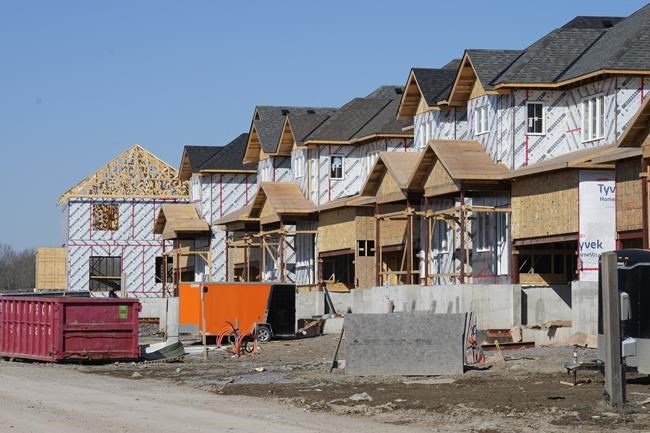OTTAWA — Canada Mortgage and Housing Corp. says the annual pace of housing starts in April edged down one per cent compared with March.
The seasonally adjusted annual rate of housing starts in Canada came in at 240,229 units for April, down from 242,267 in March, according to a report Wednesday by the national housing agency.
The overall drop came as the annual pace of starts in urban centres essentially flatlined in April month-over-month at 220,123.
The pace of multi-unit urban starts in April fell one per cent to 178,462, while single-detached urban starts rose two per cent to 41,661 units. The annual pace of rural starts was estimated at 20,106 units.
The downward trend in housing starts was largely driven by fewer multi-unit starts, particularly in Ontario, said CMHC chief economist Bob Dugan.
"The multi-unit volatility observed in Toronto, Vancouver, and Montreal in recent months is unsurprising as we continue to see last year's challenging borrowing conditions reflected in multi-unit housing starts numbers," he said in a press release.
"We expect to see continued downward pressure in these large centres."
Housing starts were lower in all three of those major cities due to decreases in both multi-unit and single-detached starts, the agency said. Starts were down 38 per cent in Toronto, 30 per cent in Vancouver and three per cent in Montreal compared with April 2023.
CMHC said the six-month moving average of the monthly seasonally adjusted annual rate was 238,585 units in April, down 2.2 per cent from 243,907 units in March.
Despite the overall decline, TD economist Rishi Sondhi said starts "continue to run at a healthy level," with government measures and rapidly rising rents supporting the construction of purpose-built rental units.
"In addition, solid gains in pre-sales made a few years ago when borrowing costs were low are boosting condo construction," he said in a note.
Sondhi said TD is forecasting housing starts will continue to decline through the remainder of this year, "reflecting more recent weakness in pre-sale activity in key markets like Toronto, elevated construction costs, and high interest rates."
Separately on Wednesday, The Canadian Real Estate Association released its latest home sales data for April, which showed the number of homes changing hands for the month rose 10.1 per cent compared with a year ago, but fell 1.7 per cent from March.
Slower monthly sales amid more new listings meant there was a 6.5 per cent jump in the overall number of properties on the national housing market, which marked the highest inventory levels since just before the onset of the COVID-19 pandemic.
This report by The Canadian Press was first published May 15, 2024.
The Canadian Press

